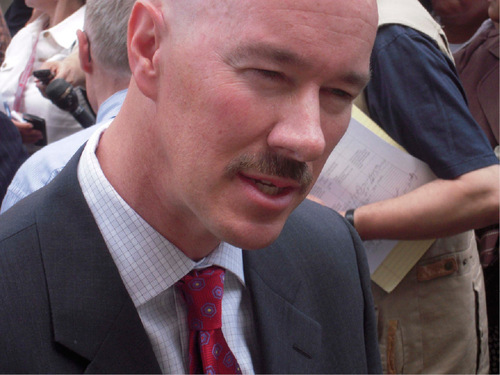This is an archived article that was published on sltrib.com in 2012, and information in the article may be outdated. It is provided only for personal research purposes and may not be reprinted.
The detective was on his back. The prostitute was above him.
"I kissed her breasts and nipples, as there was no place for my face to go," the undercover detective wrote in his report of a 2011 vice sting.
The Salt Lake City Civilian Review Board said there was some place else for his face to go. The review board also said the hands of some Salt Lake City police officers went places they shouldn't.
The board found problems with how city vice detectives investigate prostitution and sexual or illegal massages. The problems were one reason that Chief Chris Burbank disbanded the vice unit earlier this year and reassigned its detectives.
In an interview Friday, Burbank said crimes traditionally investigated by the vice unit, including prostitution, human trafficking and liquor law violations, are being handled by other units. Burbank said he is considering a new organizational structure to address those crimes.
"Not that we're getting out of vice enforcement," Burbank said. "We're just re-evaluating what vice will look like."
Burbank also confirmed that some vice detectives were disciplined over the problems that were found. The sergeant over the unit received a 60-hour suspension for failure to properly train and monitor his subordinates, Burbank said. Other detectives received written reprimands or orders to undergo training on proper procedures.
One of the procedural mistakes Salt Lake City police made: Detectives in at least three cases in 2011 violated the department's "no touch policy."
In another case, vice detectives were investigating a massage parlor on 4500 South — outside the boundaries of Salt Lake City. Once there, the board found, detectives violated the Fourth Amendment rights of the business and its employees by conducting an improper search.
The board also found vice detectives were not booking evidence into storage in a timely manner and cited the lieutenant in charge of the vice unit for failure to properly supervise his subordinates.
The Civilian Review Board issued its findings last month. The board is composed of citizens from across Salt Lake City who field complaints from citizens and investigate them independently of the police department. The review board report emphasized the errors appeared to have been made honestly and there was no criminal or malicious intent.
As far as touching suspects, reports from the review board indicate part of the problem was that vice detectives didn't know which policies they were operating under. Old policies said undercover detectives could engage in some touching of suspects if they reported it afterward to their supervisors.
In May 2011, the police department amended the policy to prohibit touching. Despite the seemingly clear language, some detectives who worked undercover to catch prostitutes and illegal masseuses were confused about whether a small amount of touching was allowed and how they were supposed to prove their case in court if there had been no physical contact with the suspects.
In the Dec. 2, 2011, case of the detective who kissed the prostitute's breasts, he argued it was not a policy violation since he had no control over her placing her breasts in his face. The review board disagreed, saying the kissing was a voluntary act on the detective's part. The board said the detective committed "conduct unbecoming."
On the same day the detective's face was in the prostitute's breasts, an undercover detective violated department policy by touching a masseuse's vagina while she was rubbing him, the board found. The masseuse later told the review board investigator she believes the detective sexually assaulted her.
Burbank said the detective was not prosecuted in court.
"It did not rise to criminal conduct," Burbank said.
On Oct. 27, 2011, at the massage parlor on 4500 South, an undercover detective touched the legs of a masseuse as the detective inquired whether the woman would massage him while topless, according to the Civilian Review Board report.
Burbank could not recall on Friday why the vice squad was investigating that massage parlor, but he said it wasn't unusual for the investigative trail to lead his detectives to other cities to locate suspects.
While the masseuse there refused to perform any sex acts or to give a massage while topless, the detective's report says he received a deep tissue massage, which the woman did not have a license to provide. That is a misdemeanor offense.
After that massage, other vice detectives arrived to cite the woman and do what's called a "protective sweep" where police find everyone inside the parlor and ensure they are not a threat to officers. But such sweeps are not supposed to look in places too small for someone to hide. The owner of the massage parlor later complained detectives were looking inside purses.
The review board sided with the parlor owner because Salt Lake City police were looking in purses outside their jurisdiction while investigating a nonviolent misdemeanor.
The board expressed concern that vice detectives were motivated to violate policy.
"This may be an individual failure but it also may reflect some feeling of pressure to produce 'statistics,' i.e., cases made, no matter what policies are in place," the review board wrote.
The reports don't specify whether any of the reviewed cases resulted in convictions against the suspects.
The Salt Lake City vice unit had been in operation for decades and was believed to be the only one in the state. Other Utah police and sheriff's departments investigate those crimes the way Salt Lake City is now.
Besides the discipline issues, Burbank said one reason for the disbanding of the vice unit is the changing nature of prostitution. There are fewer on-the-street prostitutes and more use of Internet advertising. Also, many prostitutes enter the trade because they are victims of human trafficking or have a substance abuse problem, he said.
ncarlisle@sltrib.comTwitter: @natecarlisle



